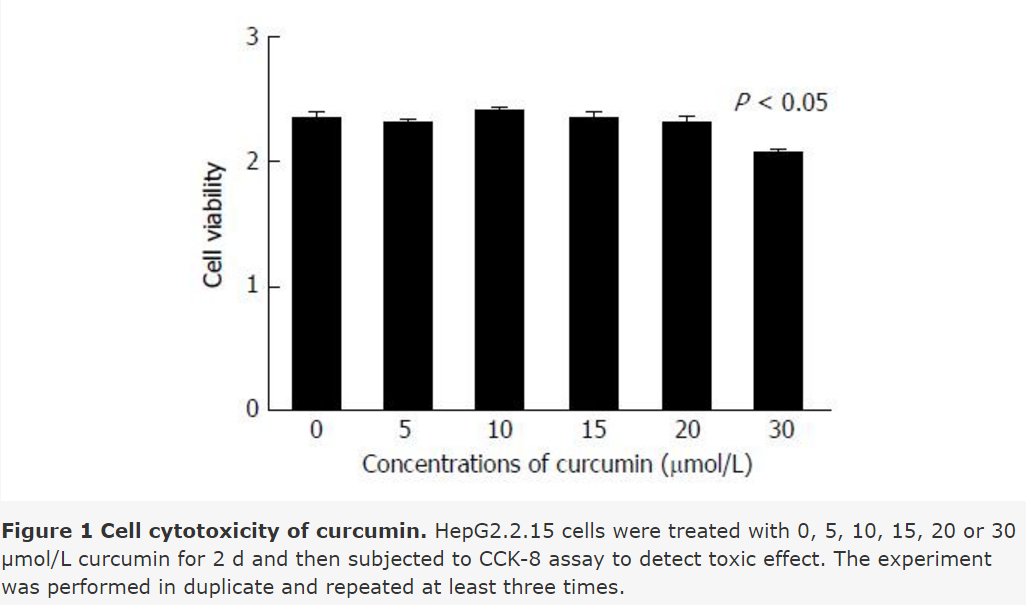河北医科大学:姜黄素可以抑制乙肝病毒的复制
Curcumin Can Inhibits hepatitis B virus Replication
摘要
目的
探讨姜黄素对乙肝病毒(HBV)共价闭合环状DNA (cccDNA)的潜在作用及其机制。
方法
用姜黄素处理HBV稳定转染的HepG2.2.15细胞株,ELISA检测HBV表面抗原(HBsAg)和e抗原(HBeAg)表达水平。用Southern blot和real-time PCR分别检测细胞内HBV DNA复制中间体和cccDNA。用Western blot检测组蛋白H3和H4的乙酰化水平。通过染色质免疫沉淀(ChIP)检测H3/ h4结合的cccDNA。采用去乙酰化酶抑制剂木鳖碱A和丁酸钠对姜黄素的作用机理进行了研究。此外,我们还与姜黄素一起测试了针对HBV的短干扰RNA (siRNAs)。
结果
姜黄素治疗导致HBsAg和HBeAg表达的时间和剂量依赖性降低,细胞内HBV DNA复制中间体和HBV cccDNA显著降低。治疗后20μmol 2 d / L姜黄素,乙肝表面抗原在HepG2.2.15细胞和cccDNA的水平减少了57.7%(P < 0.01)和75.5%(P < 0.01),分别与摘要细胞水平。同时,使用姜黄素治疗组蛋白H3乙酰化水平的时间和剂量依赖性降低,同时H3和h4结合的cccDNA水平降低。此外,去乙酰化酶抑制剂trichostatin A和丁酸钠可以阻断姜黄素的作用。此外,转染以HBV为靶点的siRNAs增强了姜黄素的抑制作用。
结论
姜黄素通过下调与cccdna结合的组蛋白乙酰化抑制HBV基因复制,有潜力发展成为针对乙肝病毒的cccDNA靶向抗病毒药物。
关键词:姜黄素,乙肝病毒,共价闭合环状DNA(cccDNA),组蛋白脱乙酰化
核心提示:我们发现姜黄素通过降低共价闭合环状DNA结合组蛋白乙酰化来抑制乙肝病毒(HBV)的复制和表达。此外,针对HBV的siRNAs与姜黄素协同作用,增强了对HBV的抑制作用。
Curcumin inhibits hepatitis B virus infection by down-regulating cccDNA-bound histone acetylation
Abstract
AIM To investigate the potential effect of curcumin on hepatitis B virus (HBV) covalently closed circular DNA (cccDNA) and the underlying mechanism.
METHODS
A HepG2.2.15 cell line stably transfected with HBV was treated with curcumin, and HBV surface antigen (HBsAg) and e antigen (HBeAg) expression levels were assessed by ELISA. Intracellular HBV DNA replication intermediates and cccDNA were detected by Southern blot and real-time PCR, respectively. The acetylation levels of histones H3 and H4 were measured by Western blot. H3/H4-bound cccDNA was detected by chromatin immunoprecipitation (ChIP) assays. The deacetylase inhibitors trichostatin A and sodium butyrate were used to study the mechanism of action for curcumin. Additionally, short interfering RNAs (siRNAs) targeting HBV were tested along with curcumin.
RESULTS
Curcumin treatment led to time- and dose-dependent reductions in HBsAg and HBeAg expression and significant reductions in intracellular HBV DNA replication intermediates and HBV cccDNA. After treatment with 20 μmol/L curcumin for 2 d, HBsAg and cccDNA levels in HepG2.2.15 cells were reduced by up to 57.7% (P < 0.01) and 75.5% (P < 0.01), respectively, compared with levels in non-treated cells. Meanwhile, time- and dose-dependent reductions in the histone H3 acetylation levels were also detected upon treatment with curcumin, accompanied by reductions in H3- and H4-bound cccDNA. Furthermore, the deacetylase inhibitors trichostatin A and sodium butyrate could block the effects of curcumin. Additionally, transfection of siRNAs targeting HBV enhanced the inhibitory effects of curcumin.
CONCLUSION
Curcumin inhibits HBV gene replication via down-regulation of cccDNA-bound histone acetylation and has the potential to be developed as a cccDNA-targeting antiviral agent for hepatitis B. Key Words: Curcumin, Hepatitis B virus, Covalently closed circular DNA, Histone deacetylation Core tip: We showed that curcumin inhibited hepatitis B virus (HBV) replication and expression via reductions in covalently closed circular DNA-bound histone acetylation. Furthermore, siRNAs targeting HBV acted synergistically with curcumin, resulting in enhanced inhibition of HBV.
World J Gastroenterol. Sep 14, 2017; 23(34): 6252-6260
Published online Sep 14, 2017. doi: 10.3748/wjg.v23.i34.6252https://www.wjgnet.com/1007-9327/full/v23/i34/6252.htm
